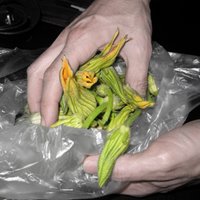 Flowers look great on the dining table--deep fried, dragged in melted butter, or arranged on a field of salad greens or a cool frosting plateau.
Flowers look great on the dining table--deep fried, dragged in melted butter, or arranged on a field of salad greens or a cool frosting plateau.Prickly Situation
Artichokes, also known as Globe Artichokes, belong to the same family of flower as the Scotch Thistle. The base of the inner leaves and the cup-like structure that supports what eventually matures into a giant thistle-like flower (the heart) are the parts you eat. The mass of filaments packed on top of the heart, the choke, is the part that blossoms, and has to be scooped out in larger specimens before eating. In small artichokes, you can simply trim off the fibrous leaf ends and eat the entire thing, choke and all.
Squashed Hopes
Squash blossoms are the flowers of the zucchini and summer squash. These vegetables are technically fruit, just like the tomato, because they are the seed-bearing structures of the plant. There are also male blossoms, which can be harvested and eaten without reducing your crop. You can tell the male blossoms by their thin stems. Female blossom stems are thicker. Squash blossoms are often lightly battered and deep fried, sometimes with a stuffing of some kind. But they can also be sauteed simply with butter. They have a delicate, fresh squash-like flavor and aroma.
Fast Food
Technically not part of the lily clan (such as tiger, easter, etc.), daylilies bear a superficial resemblance to their more ornate doppelgangers. Daylilies open their flowers during the day only to have them wither at night and replaced the next day by fresh ones. Their dried flowers are used in Chinese medicine as well as cuisine such as hot and sour soup and mu shu pork. True lilies such as the tiger lily are poisonous to cats. Daylilies are not.
Strike the Posie
There are a bunch of flowers that you don't cook, don't have a lot of flavor, but sure dress up that bag of prewashed salad greens you're serving to the wife's boss. Nasturtium, pansies, rose petals (white part removed), and pot marigold petals are just a few of these varieties. One warning: although they look gorgeous, pesticides are employed with reckless abandon on flower farms, which is bad for both the environment and the people who have to work there. So be sure you're buying organic flowers to feed your family and friends, not the kind from the local flower shop.

No comments:
Post a Comment